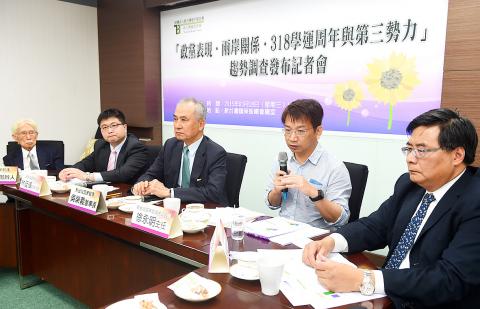One year on from the Sunflower movement, people are now more supportive of a third political force in next year’s legislative elections, a survey conducted by the Taiwan Brain Trust showed yesterday.
“The Sunflower movement last year was a very important event in Taiwanese politics; it certainly contributed to the election of independent Taipei Mayor Ko Wen-je (柯文哲) and could have an impact on next year’s legislative election,” the think tank’s chairman, Wu Rong-i (吳榮義), told a news conference to release the results of the poll conducted last week on current political issues.
“According to the poll, 46.4 percent of respondents said they might or would definitely support candidates from a third political force and 46 percent said they would cast their second vote for a third political party,” Wu said.

Photo: Chien Jung-fong, Taipei Times
As many as 58.4 percent of respondents believed that the Chinese Nationalist Party (KMT) was defeated in last year’s nine-in-one elections not by the Democratic Progressive Party (DPP), but by young voters and society as a whole, Wu added.
“As many as 54.9 percent of respondents are opposed to the prosecution of people who took part in the Sunflower movement, and only 37.8 percent believe the prosecutions are legitimate,” Wu said.
However, although 72.3 percent of respondents believe that the DPP will defeat the KMT in next year’s presidential election, the results of the poll show that the DPP’s support rate, while higher than the KMT’s, is dropping.
“The support rate for the KMT grew slightly from 11 percent [in December] to 16.7 percent [in January] and 18.3 percent now, while its dissatisfaction rate dropped from 80 percent [in December] to 77.2 percent [in January] and to 74.9 percent now, showing that its decline may have halted,” Soochow University associate professor of political science Hsu Yung-ming (徐永明) said. “Meanwhile, the dissatisfaction rate with the DPP climbed from 35.4 percent [in December] to 43.1 percent [in January] and to 38.4 percent now, while its approval rating slid from 46.3 percent [in January] to 37.8 percent.”
“The drop in approval ratings among pan-green supporters — from 67.4 percent to 54.8 percent — is especially obvious. It might have been caused by the recent scandals over the council speaker election and [the DPP] presidential primary, but it is a warning sign for the DPP,” he added.
While the support rate for both parties remained low, the approval ratings for both parties’ chairpersons were high — with the DPP’s Tsai Ing-wen (蔡英文) garnering 59.6 percent, while the KMT’s Eric Chu (朱立倫), the New Taipei City mayor, received 52.4 percent.
“Interestingly, both politicians attract support from each other’s party,” Hsu said. “If we compare the results to the high support for a third political force, we may infer that party lines have blurred.”
In such a climate, political parties should employ new thinking and new strategies, Hsu said.

INVESTIGATION: The case is the latest instance of a DPP figure being implicated in an espionage network accused of allegedly leaking information to Chinese intelligence Democratic Progressive Party (DPP) member Ho Jen-chieh (何仁傑) was detained and held incommunicado yesterday on suspicion of spying for China during his tenure as assistant to then-minister of foreign affairs Joseph Wu (吳釗燮). The Taipei District Prosecutors’ Office said Ho was implicated during its investigation into alleged spying activities by former Presidential Office consultant Wu Shang-yu (吳尚雨). Prosecutors said there is reason to believe Ho breached the National Security Act (國家安全法) by leaking classified Ministry of Foreign Affairs information to Chinese intelligence. Following interrogation, prosecutors petitioned the Taipei District Court to detain Ho, citing concerns over potential collusion or tampering of evidence. The

‘FORM OF PROTEST’: The German Institute Taipei said it was ‘shocked’ to see Nazi symbolism used in connection with political aims as it condemned the incident Sung Chien-liang (宋建樑), who led efforts to recall Democratic Progressive Party (DPP) Legislator Lee Kun-cheng (李坤城), was released on bail of NT$80,000 yesterday amid an outcry over a Nazi armband he wore to questioning the night before. Sung arrived at the New Taipei City District Prosecutors’ Office for questioning in a recall petition forgery case on Tuesday night wearing a red armband bearing a swastika, carrying a copy of Adolf Hitler’s Mein Kampf and giving a Nazi salute. Sung left the building at 1:15am without the armband and apparently covering the book with a coat. This is a serious international scandal and Chinese

Seventy percent of middle and elementary schools now conduct English classes entirely in English, the Ministry of Education said, as it encourages schools nationwide to adopt this practice Minister of Education (MOE) Cheng Ying-yao (鄭英耀) is scheduled to present a report on the government’s bilingual education policy to the Legislative Yuan’s Education and Culture Committee today. The report would outline strategies aimed at expanding access to education, reducing regional disparities and improving talent cultivation. Implementation of bilingual education policies has varied across local governments, occasionally drawing public criticism. For example, some schools have required teachers of non-English subjects to pass English proficiency

TRADE: The premier pledged safeguards on ‘Made in Taiwan’ labeling, anti-dumping measures and stricter export controls to strengthen its position in trade talks Products labeled “made in Taiwan” must be genuinely made in Taiwan, Premier Cho Jung-tai (卓榮泰) said yesterday, vowing to enforce strict safeguards against “origin laundering” and initiate anti-dumping investigations to prevent China dumping its products in Taiwan. Cho made the remarks in a discussion session with representatives from industries in Kaohsiung. In response to the US government’s recent announcement of “reciprocal” tariffs on its trading partners, President William Lai (賴清德) and Cho last week began a series of consultations with industry leaders nationwide to gather feedback and address concerns. Taiwanese and US officials held a videoconference on Friday evening to discuss the